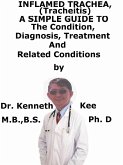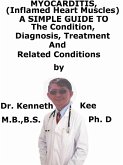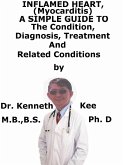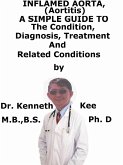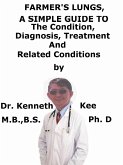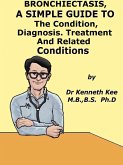Chronic inflammation of lung tissue can result in irreversible scarring (pulmonary fibrosis).
Pneumonitis is not a definite disease but a sign of an underlying disorder.
While pneumonia is technically a form of pneumonitis, most doctors are referring to other causes (hypersensitivity or chemical effect) of lung inflammation when they use the term "pneumonitis".
Acute chemical pneumonitis produces swelling of the lung tissue, movement of fluid into the air spaces in the lung and decreased ability to absorb oxygen and remove carbon dioxide.
In severe instances, death of patients may occur from hypoxia.
Chronic pneumonitis may result from low levels of exposure to the irritant over long periods of time, producing inflammation which may result in fibrosis, leading to reduced gas exchange and stiffening of the lung, and eventually resulting in respiratory failure and death.
Causes
The disease can be caused by many known factors such as:
1. Breathing in animal dander,
2. Exposure to feathers or bird excrement,
3. Aspiration inhaling small food particles,
4. Sepsis,
5. Inhaling chemicals, such as of spores of some species of mushroom or Sodium hydroxide and
6. Receiving radiation therapy to the chest
Causes of pneumonitis are:
1. Pneumonia - . Pneumonitis is normally used for noninfectious causes of lung inflammation.
2. Inhalation of foreign matter, normally of stomach contents
3. Pertussis (whooping cough)
4. Exposure to an inhaled allergen
5. Connective tissue diseases
6. Adverse reaction to a drug or toxic chemical; many household and industrial chemicals
7. Exposure to dangerous levels of chlorine gas
8. Inhalation of dangerous substances can happen during smelting, welding or other metalwork
9. Medicine: a variety of medicines can cause interstitial pneumonitis
10. Radiation therapy
Symptoms of pneumonitis are:
1. Shortness of breath
2. Cough
3. Fatigue
4. Loss of appetite
5. Unintentional weight loss
6. Cyanosis
7. Finger clubbing
8. Exercise intolerance
Diagnosis
At the physical examination, the doctor will use a stethoscope to listen carefully to the lungs while the patient breathes.
1. Blood tests: FBC may be raised neutrophilia, lymphocytosis, eosinophilia, ESR raised in inflammation
2. Blood gases: hypoxemia
3. Sputum or culture of lung secretions with bronchoscopy
4. Serum activating antibodies against offending antigens for suspected pneumonitis
Chest X-ray
CXR may be normal or show micro-nodular or reticular opacities
CT scan
It may show:
1. Diffuse, patchy ground-glass attenuation and small, poorly defined centrilobular nodules;
2. Patchy areas of air-trapping;
3. Evidence of pulmonary fibrosis and
4. Honeycombing seen in chronic and advanced lung disease
Spirometer measure lung function to see if it is normal
Bronchoscopy check brochioles and do lung lavage or obtain samples of cells for testing
Surgical lung biopsy
Treatment
Treatment of pneumonitis is dependent on the underlying cause and may need medicines such as:
1. Systemic corticosteroid therapy, which can improve resolution of pneumonitis.
These drugs work by suppressing the immune system, decreasing inflammation in the lungs.
2. Antibiotics for infection.
3. If the patient has hypersensitivity or chemical pneumonitis, the doctor will advise eradicating exposure to the allergen or chemical irritating to the lungs.
4. Oxygen therapy
5. Lifestyle and home remedies
No smoking
Change of hobbies
Change of work
Pneumonitis that goes not noticed or not treated can produce irreversible lung damage.
TABLE OF CONTENT
Introduction
Chapter 1 Inflamed Lungs (Pneumonitis)
Chapter 2 Causes
Chapter 3 Symptoms
Chapter 4 Diagnosis...
Dieser Download kann aus rechtlichen Gründen nur mit Rechnungsadresse in A, B, CY, CZ, D, DK, EW, E, FIN, F, GR, H, IRL, I, LT, L, LR, M, NL, PL, P, R, S, SLO, SK ausgeliefert werden.



